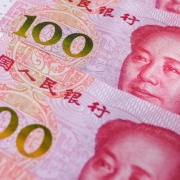The Chinese Communist Party Is Hard At Work Buying Influence In The Capitalist West And With Global Corporations.
The Chinese Communist Party is waging information warfare to shape American public opinion and influence our economic and government policy to their benefit.
The CCP doesn’t shape public opinion by buying billboards and TV ads. That kind of persuasion is far too American for them.
Instead, they co-opt our leaders and buy entire companies.
China’s methods are more sophisticated and insidious than simply passing off envelopes stuffed with cash to American agents of influence. Often, the agents don’t even know they’ve been recruited.
The CCP manipulates the self-interest of its targets, making them unwitting recruits.
Rarely do you hear one of these influencers say, “That Communist Party of China sure is great—we ought to let it run the show! Everyone get on board!”
Instead, they’ll say something along the lines of “doing business with the CCP is good ol’ free market capitalism,” or “we need a peaceful and harmonious world,” or “this is what any reasonable person would advocate.”
But everything they say and do—or don’t say and don’t do—advances the aims of the CCP.
Some of these influencers have a vested interest in the status quo.
Disney, the parent company of ABC News, owns a theme park and distributes films in the People’s Republic. Ditto NBC (Universal theme park/studio), CBS (Paramount Studios), and CNN (Warner Brothers theme parks and studio). Hollywood needs permission from China’s government to distribute its movies, so it gives the Communists in Beijing the “final cut.”
For decades, American businesses in China have been declining to speak up even when the CCP hacked their computers, stole blueprints, and produced knock-offs of their own products. Not only did they not file complaints against trade law violations, but they also went further and advocated continuing the same lopsided dysfunctional relationship that has empowered Beijing. They feared offending the regime that had absolute control over their business in China. They knew China could withhold or revoke permits, impose restrictions, and even confiscate their factories.
Wall Street financiers earn billions doing business with China’s Communist government. Beijing has given billions of dollars to Bridgewater Capital, a private equity fund run by Ray Dalio. Naturally, you will often see Dalio on TV telling us all how China’s Communist system is superior to our own.
Hank Paulson headed Goldman Sachs when he wasn’t U.S. Treasury Secretary. He and his fellow Wall Street bankers have been reliable partners in advancing the Chinese Communist Party line promoting globalism-über-alles. Wall Street is in it for the money and they either don’t realize or don’t care that they’re selling out the United States. Commerce has weakened their spirit of patriotism.
Wall Street has pushed hard to invest American pension and index funds in Chinese government-controlled companies. This not only shovels money to the dictators, but it also threatens to turn millions of ordinary Americans into Chinese agents of influence as they will be loath to stand up to the CCP lest their pensions and stock portfolios be endangered.
Beijing has directly paid McKinsey & Company management consultants, and McKinsey in turn tells its clients—including top companies and politicians—what a great and responsible business partner the CCP is.
Then there’s the import lobby. Everyone from Walmart and the Footwear and Apparel Association (really the footwear and apparel importers association) to the U.S. Chamber of Commerce and the Business Roundtable depend on cheap imports from China. They lobby against tariffs on China, which coincidentally, is exactly what the CCP wants them to do. Note that many newspapers depend on advertising revenue from these importers and the retailers who carry their goods.
When these vested interests say it’s in “the national interest” for us to continue down the current path with China, they mean it’s in their own business interest.
The Chinese Communist Party understands the corrupting influence of foreign business entanglements. Financial journalist and author Eamonn Fingleton explains how the Chinese empire threw itself open to foreign capital in the 19th century.
“The foreign investors formed alliances with the local elites, who in effect became lobbyists for the foreign capital. Foreign money quickly suffused government and largely disabled independent policymaking. Soon the local elites came to identify with the foreigners,” he writes.
The Chinese Communists learned from that history and now run the same play, only in reverse. They bought American elites and use them as their lobbyists in Washington. The elites have come to identify their interests with the CCP’s interests. American businesses became Beijing’s apologists and lobbyists.
The CCP uses this same tactic around the world.
Germany, France, and Great Britain also have global corporations eager to drink from the river of CCP money. The European Union and Germany have been largely silent as Beijing crushes Hong Kong. Diplomats in Brussels and Berlin took their cue from corporations that don’t want to disrupt business with Beijing.
Remember this the next time you hear “we can’t go it alone, we must work with our allies” to take on China.
The CCP is adept at peeling off allies. It exploits the weaknesses of its targets to enlist them in its cause.
Businessmen like money, so Beijing offers lucrative commercial opportunities. Politicians need money, so the CCP has campaign donors to work its will on our political leaders. Policymakers need to believe they are big thinkers and strategic masterminds, so the CCP cloaks its nationalist agenda in the language of “globalization,” “globalism,” and “a post-national future.” Reporters are susceptible to groupthink and conventional wisdom. They self-censor in their intellectual insecurity and suck up to their powerful sources on Wall Street and in Washington, so the CCP plays to these weaknesses.
The CCP corrupts everything and everyone it touches—in our culture, in our economy, and in our government.
This article first appeared at American Greatness.




